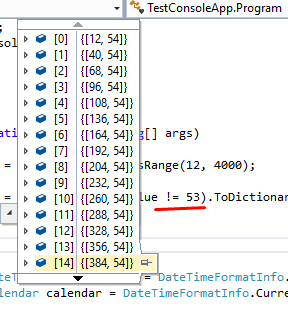P.s.: in a year can be 52, 53, 54 weeks, not sure about 51
1. If we will check With Calendar we will get results that we can have only 53 or 54 weeks.
2. This is incorrect result (read the end of my answer)
You can check it with the following app:
using System;
using System.Collections.Generic;
using System.Drawing;
using System.Globalization;
using System.Linq;
namespace TestConsoleApp
{
class Program
{
public static void Main(string[] args)
{
var b = CountWeeksForYearsRange(1, 4000);
var c = b.Where(a => a.Value != 53).ToDictionary(a=>a.Key, a=>a.Value);
}
static DateTimeFormatInfo dfi = DateTimeFormatInfo.CurrentInfo;
static Calendar calendar = DateTimeFormatInfo.CurrentInfo.Calendar;
private static int CountWeeksInYear(int year)
{
DateTime date = new DateTime(year, 12, 31);
return calendar.GetWeekOfYear(date, dfi.CalendarWeekRule, dfi.FirstDayOfWeek);
}
private static Dictionary<int,int> CountWeeksForYearsRange(int yearStart, int yearEnd)
{
Dictionary<int, int> rez = new Dictionary<int, int>();
for (int i = yearStart; i <= yearEnd; i++)
{
rez.Add(i, CountWeeksInYear(i));
}
return rez;
}
}
}
and there will be only 53 and 54 values.
This means that for faster work of method we can have pre-coded function for such situation.
Years with not 53 weeks
![enter image description here]()
Years with not 53 and not 54 weeks:
![enter image description here]()
So in this case we can generate simple array of years that have 54 weeks from 0 to 4000 years:
12,40,68,96,108,136,164,192,204,232,260,288,328,356,384,412,440,468,496,508,536,564,592,604,632,660,688,728,756,784,812,840,868,896,908,936,964,992,1004,1032,1060,1088,1128,1156,1184,1212,1240,1268,1296,1308,1336,1364,1392,1404,1432,1460,1488,1528,1556,1584,1612,1640,1668,1696,1708,1736,1764,1792,1804,1832,1860,1888,1928,1956,1984,2012,2040,2068,2096,2108,2136,2164,2192,2204,2232,2260,2288,2328,2356,2384,2412,2440,2468,2496,2508,2536,2564,2592,2604,2632,2660,2688,2728,2756,2784,2812,2840,2868,2896,2908,2936,2964,2992,3004,3032,3060,3088,3128,3156,3184,3212,3240,3268,3296,3308,3336,3364,3392,3404,3432,3460,3488,3528,3556,3584,3612,3640,3668,3696,3708,3736,3764,3792,3804,3832,3860,3888,3928,3956,3984
And this is means that most optimized method will be:
//Works only with 1-4000 years range
public int CountWeeksInYearOptimized(int year)
{
return (_yearsWith54Weeks.IndexOf(year) == -1) ? 53 : 54;
}
private List<int> _yearsWith54Weeks = new List<int> { 12, 40, 68, 96, 108, 136, 164, 192,
204, 232, 260, 288, 328, 356, 384, 412, 440, 468, 496, 508, 536, 564,
592, 604, 632, 660, 688, 728, 756, 784, 812, 840, 868, 896, 908, 936,
964, 992, 1004, 1032, 1060, 1088, 1128, 1156, 1184, 1212, 1240, 1268,
1296, 1308, 1336, 1364, 1392, 1404, 1432, 1460, 1488, 1528, 1556, 1584,
1612, 1640, 1668, 1696, 1708, 1736, 1764, 1792, 1804, 1832, 1860, 1888,
1928, 1956, 1984, 2012, 2040, 2068, 2096, 2108, 2136, 2164, 2192, 2204,
2468, 2496, 2508, 2536, 2564, 2592, 2604, 2632, 2660, 2688, 2728, 2756,
2784, 2812, 2840, 2868, 2896, 2908, 2936, 2964, 2992, 3004, 3032, 3060,
3088, 3128, 3156, 3184, 3212, 3240, 3268, 3296, 3308, 3336, 3364, 3392,
3668, 3696, 3708, 3736, 3764, 3792, 3804, 3832, 3860, 3888, 3928, 3956,
3984 };
or if you don't want to pre-calculated data:
DateTimeFormatInfo dfi = DateTimeFormatInfo.CurrentInfo;
Calendar calendar = DateTimeFormatInfo.CurrentInfo.Calendar;
private int CountWeeksInYear(int year)
{
DateTime date = new DateTime(year, 12, 31);
return calendar.GetWeekOfYear(date, dfi.CalendarWeekRule, dfi.FirstDayOfWeek);
}
UPD: BUT! Looks like this is incorrect way.
I don't know why so, but looks like Calendar saying incorrect number. And correct count of weeks is always on less on 1 week. You can check it manually:
Let's calc days in the following years with Calendar:
2011+2012+2013:
53+54+53=160 weeks.
But stop!
(365+366+365)/7 = 157.
So best way will be to do -1 to the value that will be shown by calendar
Or to use the following fastest method:
//Works only with 1-4000 years range
public int CountWeeksInYearOptimized(int year)
{
return (_yearsWith54Weeks.IndexOf(year) == -1) ? 52 : 53;
}
private List<int> _yearsWith54Weeks = new List<int> { 12, 40, 68, 96, 108, 136, 164, 192,
204, 232, 260, 288, 328, 356, 384, 412, 440, 468, 496, 508, 536, 564,
592, 604, 632, 660, 688, 728, 756, 784, 812, 840, 868, 896, 908, 936,
964, 992, 1004, 1032, 1060, 1088, 1128, 1156, 1184, 1212, 1240, 1268,
1296, 1308, 1336, 1364, 1392, 1404, 1432, 1460, 1488, 1528, 1556, 1584,
1612, 1640, 1668, 1696, 1708, 1736, 1764, 1792, 1804, 1832, 1860, 1888,
1928, 1956, 1984, 2012, 2040, 2068, 2096, 2108, 2136, 2164, 2192, 2204,
2468, 2496, 2508, 2536, 2564, 2592, 2604, 2632, 2660, 2688, 2728, 2756,
2784, 2812, 2840, 2868, 2896, 2908, 2936, 2964, 2992, 3004, 3032, 3060,
3088, 3128, 3156, 3184, 3212, 3240, 3268, 3296, 3308, 3336, 3364, 3392,
3668, 3696, 3708, 3736, 3764, 3792, 3804, 3832, 3860, 3888, 3928, 3956,
3984 };



intand not adouble/decimal) ? – Divide